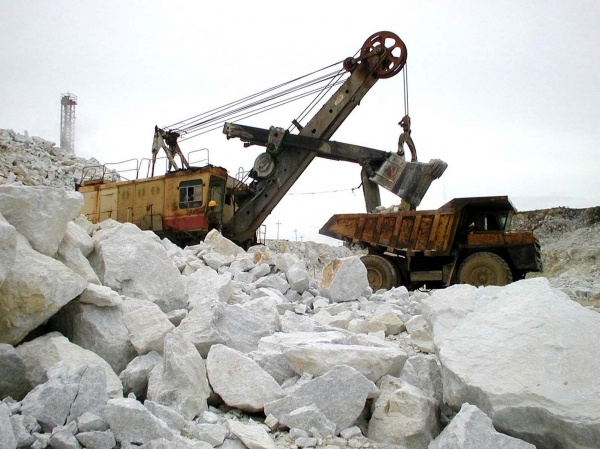Despite hurdles, preparations needed for NK resources development: experts
Diplomatic ties between US, NK should come first before exploring mineral resources
By Shin Ji-hyePublished : Oct. 28, 2018 - 20:09
Despite uncertainties stemming from UN sanctions against the North, preparations should still be made for resources development in North Korea, such as setting up an inter-Korean cooperative body, personnel exchanges and joint research, South Korean mineral experts have said.
Speaking at a forum last week, they said approaches to North Korea for co-development should focus on persuading the North of its benefits.
Since the inter-Korean summit last month, expectations are high in the South that, as the world’s fifth-largest minerals consumer, it might be able to replace some of the imports it relies on with cheaper mineral resources from the North.
The North is estimated to have 728 mines and the volume of its mine production is 4.3 trillion won ($3.7 billion), 150 percent as much as the corresponding figure for the South, according to the state-run Korea Resources Corporation.
“We have so far viewed the North’s minerals as something profitable only, but that is not what the North wants. We should now have a long-term win-win strategy that can benefit both,” said Lee In-woo, director of Korea Resources Corporation’s inter-Korean mineral resource business division, during a forum on inter-Korean mineral resource development last week.
The strategy should focus on how the North can benefit through infrastructure, jobs and profits from mineral sales, he said.
Lee identified five minerals -- iron, zinc, magnesite, limestone and anthracite -- that can benefit the two Koreas. That is based on the South’s annual demand and the size of the North’s mineral reserves, which should be large enough to be profitable.

He proposed to establish a special resource industrial complex in the North’s coal field, areas near the Yellow Sea and in Tanchon centering on the five minerals. Tanchon is thought to have the world’s second-largest magnesite reserves, following China, which dominates the global market with an 80 percent share.
Despite these hopes, hurdles lie ahead before meaningful inter-Korean mineral cooperation can take place. UN sanctions prohibit all member nations from trading with North Korea and the South has said it is willing to comply with the international rules.
The UN sanctions also ban international organizations, such as the International Monetary Fund, the World Bank and the Asian Development Bank from providing any financial support to the North.
“The precondition of mineral development in the North is the normalization of the relationship between the North and the US. Without the settlement of the North’s nuclear programs, there will be no inter-Korean economic cooperation,” said Kim Chang-do, a senior researcher at the Posco Research Institute, at the forum.
“Establishing diplomatic ties between the US and the North will be a milestone for inter-Korean economic cooperation,” he said, citing the relationships between the US and China and the US and Vietnam.
Both China and Vietnam have seen rapid economic growth since they established diplomatic ties with the US in 1979 and 1995, respectively. For Vietnam, since establishing ties, financial support from international organizations resumed, economic sanctions were lifted and it joined the Association of Southeast Asian Nations and Asia-Pacific Economic Cooperation.
Although uncertainties remain, experts agreed that the two Koreas should make preparations for the future instead of just waiting for the situation to improve.
Researcher Kim said the two Koreas can prepare for future opportunities through personnel exchanges, defining terms and on-site inspections.
“We had a conversation with North Korean steel experts, but we were not able to understand half of their terms. It was like a foreign language,” he said, stressing the need to define professional terms.
Director Lee from the Korea Resources Corporation went further, saying an inter-Korean mineral cooperation body should be set up to help the two sides better understand each other and to gain more information on the North’s situation.
Currently, the Ministry of Trade, Industry and Energy and the Korea Resources Corporation are mapping out a legal framework for the development of the North’s mineral resources.
Kim Doo-yeol, an official representing the Ministry of Trade, Industry and Energy’s mineral resource team, said the South should make more efforts to bring international society to the discussion table with the North.
“Instead of pursing a short-term goal, we should actively support the North to come out into the international society,” Kim said.
“We can invite international organizations like the Asian Infrastructure Investment Bank or the Asian Development Bank as well as other nations, like the US or Russia, to the discussion table with the North.”
By Shin Ji-hye (shinjh@heraldcorp.com)








![[KH Explains] Hyundai's full hybrid edge to pay off amid slow transition to pure EVs](http://res.heraldm.com/phpwas/restmb_idxmake.php?idx=644&simg=/content/image/2024/04/18/20240418050645_0.jpg&u=20240419100350)







![[From the Scene] Monks, Buddhists hail return of remains of Buddhas](http://res.heraldm.com/phpwas/restmb_idxmake.php?idx=652&simg=/content/image/2024/04/19/20240419050617_0.jpg&u=20240419175937)

![[KH Explains] Hyundai's full hybrid edge to pay off amid slow transition to pure EVs](http://res.heraldm.com/phpwas/restmb_idxmake.php?idx=652&simg=/content/image/2024/04/18/20240418050645_0.jpg&u=20240419100350)

![[Today’s K-pop] Illit drops debut single remix](http://res.heraldm.com/phpwas/restmb_idxmake.php?idx=642&simg=/content/image/2024/04/19/20240419050612_0.jpg&u=)